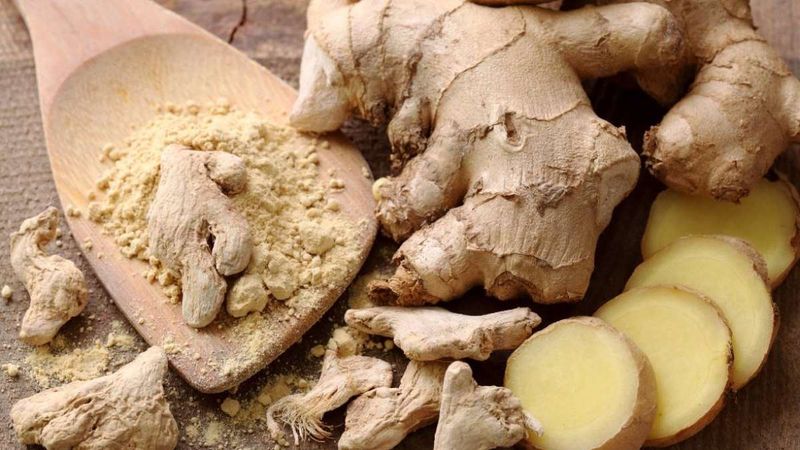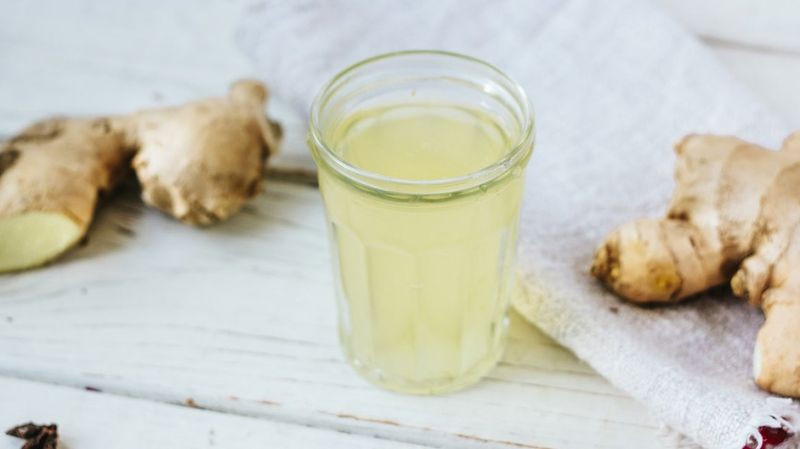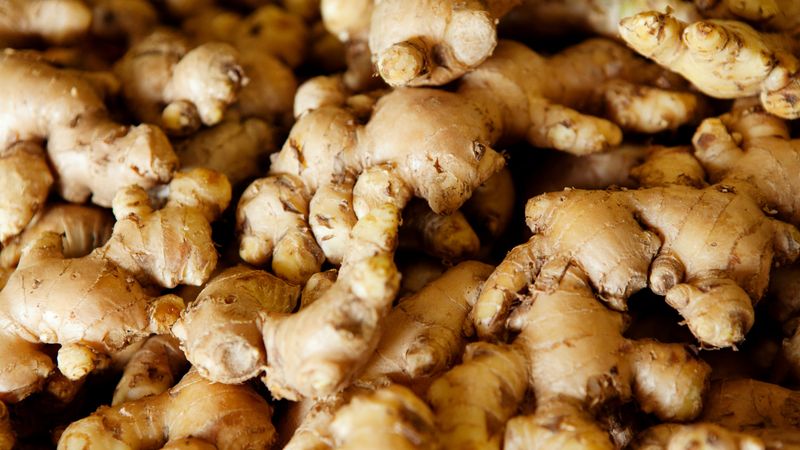Ginger is more than just a spicy kitchen ingredient – it’s a powerhouse of health benefits that has been used for thousands of years. This knobby root can transform your health in surprising ways when added to your daily meals. From soothing an upset stomach to fighting inflammation, ginger works like natural medicine that tastes great too.
1. Improved Digestion

Your stomach will thank you when ginger becomes part of your meals. This powerful root kicks digestive juices into high gear, helping your body break down food more efficiently. The natural compounds stimulate saliva and bile production, making the whole digestive process smoother. Many people notice less bloating and gas after adding ginger to their diet. The root works by speeding up how quickly food moves from your stomach to your small intestine, preventing that uncomfortable full feeling. This is why ginger tea after a heavy meal feels so good. For those with chronic digestive issues, even a small daily dose can make a big difference. Try grated fresh ginger in morning smoothies, steeped as tea, or added to stir-fries for an easy digestive boost that works gently but effectively.
2. Reduced Nausea

Morning sickness doesn’t stand a chance against ginger’s powerful anti-nausea properties. Pregnant women have relied on this natural remedy for centuries, often finding relief when nothing else helps. The root’s bioactive compounds work directly on the digestive system and central nervous system to calm queasy feelings. Travelers prone to motion sickness might want to pack ginger candies or capsules before their next trip. Studies show that ginger works as effectively as some over-the-counter medications without the drowsiness. The relief typically begins within 20-30 minutes after consumption. Cancer patients undergoing chemotherapy have also found ginger helpful for managing treatment-related nausea. Whether consumed as tea, capsules, or crystallized candy, this versatile root offers gentle yet effective relief from various types of nausea without harsh side effects.
3. Anti-Inflammatory Effects

Chronic inflammation doesn’t stand a chance against ginger’s natural compounds. Gingerol and shogaol, the star players in this root, actively fight inflammation throughout your body. These compounds block the same inflammatory pathways as many medications but without the harsh side effects. Athletes and active people notice less muscle soreness when consuming ginger regularly. The root helps reduce the inflammatory response that happens after intense exercise, potentially shortening recovery time. Some studies show that daily ginger consumption can reduce exercise-induced muscle pain by up to 25%. For those battling arthritis, ginger offers natural relief that builds over time. People with osteoarthritis or rheumatoid arthritis who add ginger to their routine often report improved mobility and decreased joint pain after a few weeks of consistent use. The effects are subtle at first but become more noticeable with regular consumption.
4. Enhanced Immune Support

Cold and flu season becomes less threatening when ginger is part of your daily routine. This warming root contains chemicals that help your body fight off viruses and bacteria naturally. The antioxidants in ginger neutralize harmful free radicals that can weaken your immune system. Feeling the first signs of a cold? A hot cup of ginger tea might be just what you need. The root promotes healthy sweating, which helps your body release toxins and potentially fight off infections in their early stages. Many people swear by the combination of ginger, lemon, and honey at the first sign of illness. Your body’s natural defense system gets a gentle boost with regular ginger consumption. Unlike harsh immune stimulants, ginger supports your immune function without overactivating it, creating balanced protection. Just a small amount daily – whether in food, tea, or supplement form – can help maintain this protective effect year-round.
5. Lower Blood Sugar Levels

Managing blood sugar becomes easier with ginger in your corner. Research shows this humble root can improve insulin sensitivity – helping your body use insulin more effectively to move sugar from your bloodstream into your cells. For people with type 2 diabetes or prediabetes, this effect can be particularly valuable. The magic happens through several mechanisms at once. Ginger appears to inhibit enzymes that break down carbohydrates in your digestive tract, slowing sugar absorption into your bloodstream. It also seems to improve how your muscles use glucose, further helping to regulate blood sugar levels. Adding just 2-3 grams of ginger to your daily routine might help maintain healthier blood sugar levels over time. Whether sprinkled into morning oatmeal, blended into smoothies, or taken as a supplement, consistency is key for seeing blood sugar benefits. Remember to work with your doctor if you’re on diabetes medication, as ginger might enhance their effects.
6. Pain Relief

Monthly cramps meet their match in ginger’s natural pain-fighting power. Women who consume ginger during menstruation often report significantly reduced pain intensity and duration. The root works by blocking pain-producing prostaglandins – the same compounds targeted by over-the-counter pain medications. Headache sufferers might find relief in this ancient remedy too. Ginger tea or supplements can help reduce the intensity of migraines and tension headaches for many people. The anti-inflammatory and blood-thinning properties work together to ease pressure and pain. Muscle discomfort after a tough workout doesn’t have to linger as long when ginger is part of your recovery plan. Studies show that consuming ginger before or after exercise can reduce the resulting pain by inhibiting the inflammatory response. Unlike some pain medications that merely mask symptoms, ginger addresses the underlying inflammation causing the discomfort, offering more comprehensive relief.
7. Better Heart Health

Your heart might beat a little happier when ginger becomes a regular guest at mealtime. This zesty root helps lower total cholesterol and harmful LDL levels while raising beneficial HDL cholesterol. These changes can significantly reduce your risk of heart disease over time. Blood pressure numbers tend to improve with regular ginger consumption too. The root contains compounds that help relax blood vessels, allowing blood to flow more freely throughout your body. This natural blood-thinning effect also helps prevent dangerous clots from forming. Ginger’s antioxidant properties protect your heart in yet another way – by reducing oxidative stress on blood vessels and heart tissue. Adding just half a teaspoon of ginger powder to your daily routine, or using fresh ginger in cooking several times weekly, might contribute to long-term heart health. The benefits build gradually, making ginger a worthy addition to any heart-healthy lifestyle plan.
8. Weight Management Support

Stubborn belly fat may have met its match in ginger’s metabolism-boosting properties. This fiery root increases your body’s core temperature slightly, potentially raising your metabolic rate and helping you burn more calories even at rest. The effect is gentle but can add up over time. Feeling hungry all the time? Ginger might help with that too. Research suggests it helps regulate hunger hormones and increases feelings of fullness after meals. Many people report reduced snacking urges when consuming ginger tea between meals. The waist-to-hip ratio improvements seen in studies aren’t just about weight loss – they reflect healthier fat distribution. Ginger seems particularly effective at targeting visceral fat, the dangerous kind that surrounds organs. While not a miracle solution, adding ginger to a balanced diet and exercise routine provides valuable support for weight management goals, especially when consumed consistently over several months.
9. Cognitive and Brain Health Boost

Brain fog might clear when ginger becomes part of your regular routine. The root’s powerful anti-inflammatory compounds help protect brain cells from damage and may improve blood flow to your brain. Better circulation means more oxygen and nutrients reach your brain cells, supporting overall cognitive function. Memory and focus often sharpen with regular ginger consumption. Studies involving middle-aged women show improved working memory and reaction time after consuming ginger supplements daily. The effect builds gradually, with noticeable improvements appearing after several weeks of consistent use. Long-term brain health gets a protective boost from ginger’s antioxidant properties. These compounds help fight age-related cognitive decline by neutralizing harmful free radicals that damage brain cells over time. While research is still developing, early evidence suggests ginger might play a role in protecting against neurodegenerative conditions like Alzheimer’s disease, making it a smart addition to any brain-healthy diet.
Leave a comment